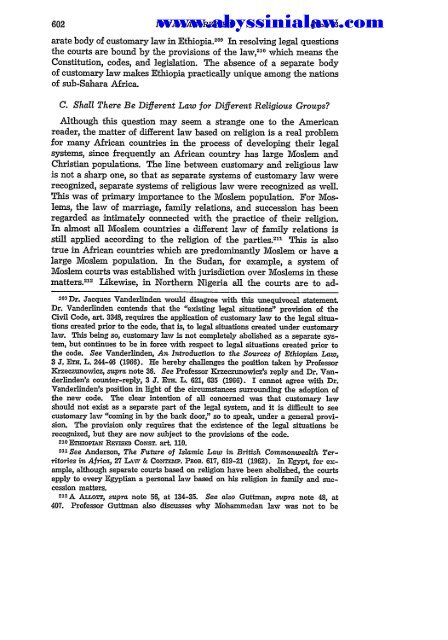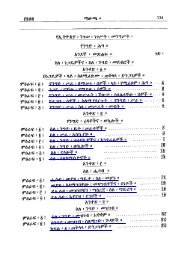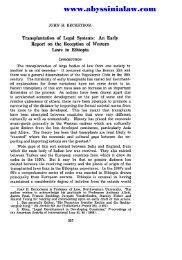Create successful ePaper yourself
Turn your PDF publications into a flip-book with our unique Google optimized e-Paper software.
IOWA www.abyssinialaw.com<br />
LAW REVIEW<br />
[Vol. 53<br />
arate body of customary law in Ethiopia.2 0 9 In resolving legal questions<br />
the courts are bound by the provisions of the law, 21 0 which means the<br />
Constitution, codes, and legislation. The absence of a separate body<br />
of customary law makes Ethiopia practically unique among the nations<br />
of sub-Sahara Africa.<br />
C. Shall There Be Different <strong>Law</strong> for Different Religious Groups?<br />
Although this question may seem a strange one to the American<br />
reader, the matter of different law based on religion is a real problem<br />
for many African countries in the process of developing their legal<br />
systems, since frequently an African country has large Moslem and<br />
Christian populations. The line between customary and religious law<br />
is not a sharp one, so that as separate systems of customary law were<br />
recognized, separate systems of religious law were recognized as well.<br />
This was of primary importance to the Moslem population. For Moslems,<br />
the law of marriage, family relations, and succession has been<br />
regarded as intimately connected with the practice of their religion.<br />
In almost all Moslem countries a different law of family relations is<br />
still applied according to the religion of the parties. 21 1 This is also<br />
true in African countries which are predominantly Moslem or have a<br />
large Moslem population. In the Sudan, for example, a system of<br />
Moslem courts was established with jurisdiction over Moslems in these<br />
matters. 2 1 2 Likewise, in Northern Nigeria all the courts are to ad-<br />
209 Dr. Jacques Vanderlinden would disagree with this unequivocal statement.<br />
Dr. Vanderlinden contends that the "existing legal situations" provision of the<br />
Civil Code, art. 3348, requires the application of customary law to the legal situations<br />
created prior to the code, that is, to legal situations created under customary<br />
law. This being so, customary law is not completely abolished as a separate system,<br />
but continues to be in force with respect to legal situations created prior to<br />
the code. See Vanderlinden, An Introduction to the Sources of Ethiopian <strong>Law</strong>,<br />
3 J. ETH. L. 244-46 (1966). He hereby challenges the position taken by Professor<br />
Krzeczunowicz, supra note 36. See Professor Krzeczunowicz's reply and Dr. Vanderlinden's<br />
counter-reply, 3 J. EvL L. 621, 635 (1966). I cannot agree with Dr.<br />
Vanderlinden's position in light of the circumstances surrounding the adoption of<br />
the new code. The clear intention of all concerned was that customary law<br />
should not exist as a separate part of the legal system, and it is difficult to see<br />
customary law "coming in by the back door," so to speak, under a general provision.<br />
The provision only requires that the existence of the legal situations be<br />
recognized, but they are now subject to the provisions of the code.<br />
210 ETmoPiN REvIsED CoNST. art. 110.<br />
2 11 See Anderson, The Future of Islamic <strong>Law</strong> in British Commonwealth Territories<br />
in Africa, 27 LAw & CosFrP. PROB. 617, 619-21 (1962). In Egypt, for example,<br />
although separate courts based on religion have been abolished, the courts<br />
apply to every Egyptian a personal law based on his religion in family and succession<br />
matters.<br />
212A ALLOrr, supra note 56, at 134-35. See also Guttman, supra note 48, at<br />
407. Professor Guttman also discusses why Mohammedan law was not to be





